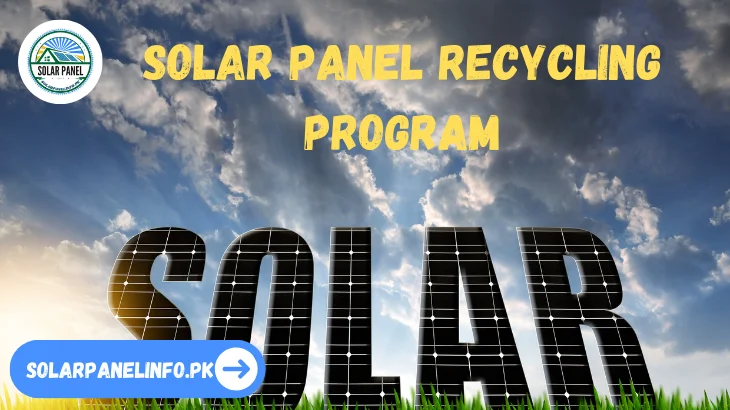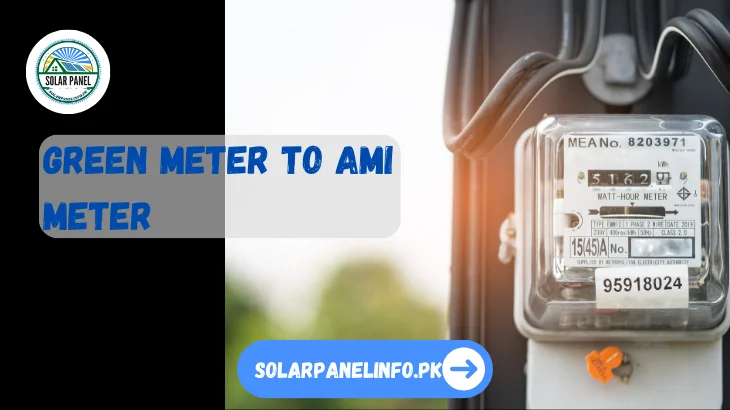Solar Panel Recycling Program
Many nations and businesses have launched solar panel recycling programmes in response to the growing global demand for sustainable end-of-life solutions for solar equipment. In the field of renewable energy, these initiatives seek to decrease environmental waste, recover valuable materials, and advance a circular economy. Solar panels usually last 25 to 30 years before being retired, so waste from these panels is becoming a concern as Pakistan’s use of solar power grows. In the development of sustainable energy, this emphasises the significance of recycling programmes.
Read more: Why Solar Panels Are Important in Our Daily Lives

بہت سی قوموں اور کاروباری اداروں نے شمسی آلات کے لیے پائیدار زندگی کے اختتامی حل کی بڑھتی ہوئی عالمی مانگ کے جواب میں سولر پینل ری سائیکلنگ پروگرام شروع کیے ہیں۔ قابل تجدید توانائی کے میدان میں، یہ اقدامات ماحولیاتی فضلہ کو کم کرنے، قیمتی مواد کی بازیافت، اور ایک سرکلر معیشت کو آگے بڑھانے کی کوشش کرتے ہیں۔ سولر پینلز عام طور پر ریٹائر ہونے سے پہلے 25 سے 30 سال تک چلتے ہیں، اس لیے ان پینلز کا فضلہ ایک تشویش کا باعث بنتا جا رہا ہے کیونکہ پاکستان میں شمسی توانائی کا استعمال بڑھ رہا ہے۔ پائیدار توانائی کی ترقی میں، یہ ری سائیکلنگ پروگراموں کی اہمیت پر زور دیتا ہے۔
Why Is Solar Panel Recycling Important?
Solar panels have a lifespan of 25 to 30 years, and as large-scale installations reach their end of life, millions are expected to be decommissioned. Without proper recycling systems, this could lead to environmental harm. While most materials in solar panels—glass, metals, silicon, and plastics—are reusable and non-toxic, improper disposal in landfills can waste resources. The increasing adoption of solar energy, especially in countries like Pakistan, underscores the urgent need to manage solar waste effectively
- Extensive electronic waste (e-waste)
- Depletion of precious materials such as silicon, silver, and aluminum
- Environmental contamination caused by toxic substances like lead and cadmium
An organised recycling initiative guarantees that these problems are managed responsibly.
Key Benefits of a Solar Panel Recycling Program
Waste Management
Maintain the landfill from overflowing and reduce the ecological impact with solar waste.
Resource Recovery
Reclamation makes it possible to recover valuable materials such as aluminum, silver, copper, and silicon.
Economic Opportunity
The sector of recycling sector generates job opportunities and, at the same time, reduces dependence on imports of raw materials.
Sustainability
This closes the renewable energy lifecycle loop by eliminating waste for the long term.
How Does Solar Panel Recycling Work?
These processes would usually embrace:
- Collection & Transportation: Used panels are gathered from private, commercial, or industrial sites.
- Disassembly: Frames and junction boxes are removed manually.
- Thermal Processing: Plastic materials are separated at high temperatures.
- Material Recovery: Glass, silicon, and metals are recovered via mechanical and/or chemical operations.
In developed countries, it is already common to have facilities for this purpose, while in Pakistan, such infrastructure is still in its infancy.
Current Status in Pakistan
In terms of solar adoption, Pakistan has come a long way, but recycling of solar panels has yet to find mention in any serious discussion. Weaknesses such as a clear policy direction, awareness, and recycling facilities could put the environment in jeopardy for years to come.
The first installations that began about a decade ago are approaching the end of their life this decade. Proactive planning is critical today.
What Pakistan Needs: Policy & Action
- National Recycling Framework: Under this framework, the government must introduce a policy for solar waste management under the aegis of the Ministry of Climate Change and NEPRA.
- Incentives for Recycling Companies: Subsidies or tax exemptions for those companies engaged in solar recycling.
- Public Awareness: Campaigns Initiative on recycling and returning old panels.
- Manufacturer Responsibility: To adopt ‘Extended Producer Responsibility (EPR)’, in which importers and manufacturers assume liability for disposal at the end of life.
- Collaboration with Global Partners: Pakistan has the opportunity to join other countries with developed recycling systems, such as Germany or Japan, to address the development of local capacity.
Global Examples and Best Practices
Countries such as Germany, Japan, and the United States have initiated programmes for recycling solar panels.
- European Union regulations mandate the recycling of solar panels following WEEE (Waste Electrical and Electronic Equipment) laws.
- Japan has put resources into research and development to enhance the efficiency of recycling.
- In the U.S., there are state-level initiatives, like those in California, focused on the responsible disposal of solar panels.
Pakistan could draw lessons from these examples to establish its effective system.
Conclusion
Sustainable end-of-life management decides the fate of solar technology. A properly designed Solar Panel Recycling Program is one way to ensure the environmental integrity of solar adoption. Action must now be taken by Pakistan: there is a real window for the country to pave the way in responsible solar energy development.
پائیدار اختتامی زندگی کا انتظام شمسی ٹیکنالوجی کی قسمت کا فیصلہ کرتا ہے۔ ایک مناسب طریقے سے ڈیزائن کیا گیا سولر پینل ری سائیکلنگ پروگرام شمسی توانائی کو اپنانے کی ماحولیاتی سالمیت کو یقینی بنانے کا ایک طریقہ ہے۔ پاکستان کو اب ایکشن لینا چاہیے: ملک کے لیے ذمہ دارانہ شمسی توانائی کی ترقی کی راہ ہموار کرنے کے لیے ایک حقیقی کھڑکی موجود ہے۔
FAQ’s
What is solar panel recycling all about?
Solar panel recycling—just recycling solar panels– is a process of the safe collection and reuse of materials from old or damaged solar panels instead of trashing them.
Why is the recycling of solar panels important?
It reduces waste, protects our environment, and recovers valuable materials like glass, silicon, and metals.
Are solar panels recyclable at all?
Yes, With the proper technology, recyclers can recover up to 95% of the materials that make up a solar panel.


